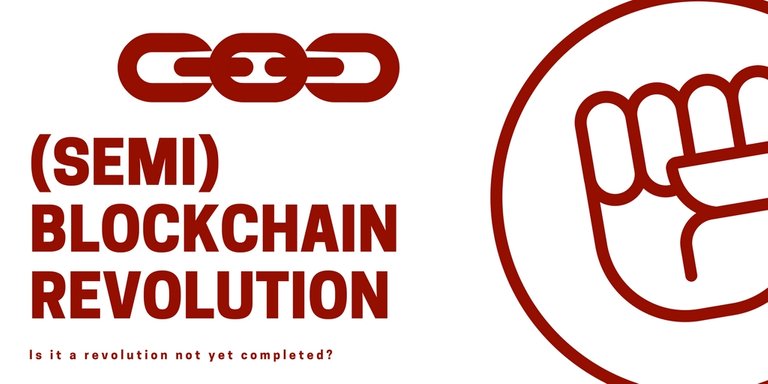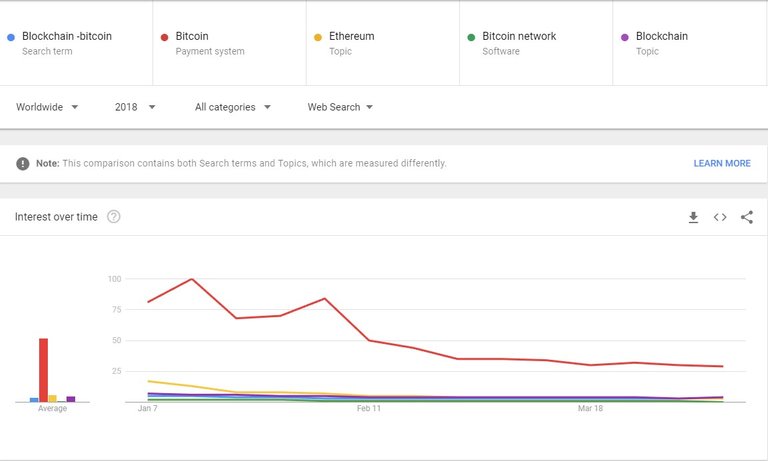
Why do we always talk about Blockchain revolution? That is the "revolution" that blockchain (understood as method, not as Bitcoin and other crypt) should bring in our society. Since a year ago, a widespread enthusiasm for the adoption of this "technology" in all areas has come to light with force.
On the one hand, this is good, because it means that more or less critical discussions on the subject are being held, with the natural consequence that these systems have evolved over time.
On the other hand, it can lead many to go to the boarding, with the concept "everyone does it, who am I not to do it?". Not really a business plan with which to present oneself to a venture capital. So, can we speak of a blockchain revolution, instead of a simple (but well present) "hype"?
Monetary gain
So, the question I'm asking myself is: what drives some people to throw their consolidated business (at best) onto blockchain?
And what drives other people to invent an idea (or little more than that) to "develop" it on blockchain?
Surely the possibility of making an ICO for themselves. If we look at the 2017 statistics on a sample of ICO, as I wrote in a previous article of mine, there are two numerical evidences:
- that about 27% of tokens lost more than half of their initial value (at the launch of the ICO)
- that if I had invested in all the ICOs in the sample, I would have earned 630% of my investment.
To give a numerical example, if I had invested € 1,000 in all 148 ICOs of the sample, i.e. € 148,000 total, I would have had a portfolio of tokens worth € 932,400 at the date of sampling (5 December 2017).
But the numbers hide what exists behind the 148 tokens sample. I must say that I did not investigate all 148 tokens reading whitepapers, verifying the team, the business model, the market analysis, if an MVP rather than a PoC was made, the metrics, etc...what a venture capital would do during an initial screening (provided that the project reaches to do that step of evaluation and is not discarded before reading the abstract only).
So I do not want to stop at these numbers.
What sparked the spark
Werner Sombart, speaking of the birth of modern capitalism, spoke of how the bourgeoisie (the middle class) were at the centre of the capitalist revolution, which would supplant the ancient economic systems:
In money they perceive the truth, indeed the only factor of power, since they know no other power other than wealth. [...] They certainly do not become entrepreneurs, because they have money [...] They too become entrepreneurs exclusively thanks to their personal qualities. But their entrepreneurship is more closely linked to money than it is to other types. By their work, the bourgeois wealth, [...] acquires decisive importance for the formation of the capitalist economy; they are the ones that sparkle the spark. (note: translated from italian)
I asked myself: could be that the possibility of profit was, by itself, the cause, the spark, that blew up the "desire" of blockchain? Was the birth of the will, to use the blockchain in different spheres of life, just a consequence?
On the other hand, the Bitcoin's blockchain was born as an alternative to the banking system, but no one would have expected such a speculation to bring the Bitcoins from € 300-400 of January 2016 to about € 17,000 in December 2017. Let us remember that only a small percentage of Bitcoin is really used in daily transactions, hard to talk about blockchain revolution related to Bitcoins. So much so that the fees on Bitcoin transactions, in December 2017, exceeded the threshold of 20 USD per transaction with peaks of 30 USD.
A crazy value if the use of Bitcoins really was for the sole purpose of replacing the banking system. Today the situation is calm, but nothing can stop this event to repeat in the future.
The speculative use on the other hand has been evident. It follows that the revolutionary spirit of the Bitcoins has been betrayed by the people who have made opportunities for financial gain.
Sadly, we can, therefore, consider the revolution born with Bitcoin, the "Bitcoin revolution", to be over.
But is it really like that is true also for the blockchain revolution? Only money moves the masses?
Google can help us to understand
Many know Google Trends. It is a Google tool that allows analyzing research trends, what is asked to the most famous and used search engine in the world (certainly in the western countries). It occurred to me to use this tool to go and check what the searches were carried out, in 2017, related to the word "blockchain".
To help us understand if Bitcoin and blockchain have always been related in the collective imagination or if there is also a more critical thought, addressed to the blockchain method and not to the crypto-currency.

The 2018 trend seems to show a different trend compared to 2017 between Bitcoin and blockchain. Seems the gap is reducing over time.

Is it a real blockchain revolution?
What is certain, is that the blockchain is giving us the chance to think with a different paradigm: to create products and services without a third party to act as guarantor.
This is the true spirit of the blockchain, the real blockchain revolution. Eliminate the guarantor, whoever it is.
I'm not talking about eliminating intermediaries, this problem can be solved individually without blockchain. Transparency can also be a solvable problem without blockchain. I'm talking about trust, an increasingly scarce element in our societies.
Replacing the banking system with a blockchain, means eliminating the bank as an institution, as well as an intermediary (but the figure of the intermediary will remain: the miners or who for them, who acquire fees to confirm the transactions will do so).
From my (very small) point of view, declare the use of blockchain anywhere in the private sphere, but especially in areas where trust is strongly present, it is simply a stretch, adopted in order to earn money by exploiting the hype. Thus the spirit of the blockchain is misguided.
For this reason, if the native goal of the blockchain is to help society and not to do monetary gain or (speculative) financial gain, i think that at the moment we can only speak of "semi" blockchain revolution, a revolution not yet completed.
Luca Venturella
https://www.linkedin.com/in/luca-venturella/
If you like this post, please remember to up-vote. Thanks!